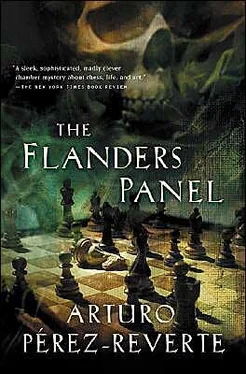Julia felt that his words were addressed to her.
“How did you know it was Cesar?” she asked Munoz, and Cesar seemed startled. Something suddenly changed in his attitude, as if Julia, by giving voice to and sharing Munoz’s accusation, had broken a vow of silence. His initial reserve disappeared at once, and his smile became a bitter, mocking grimace.
“Yes,” he said to Munoz, and that was his first formal admission of guilt, “tell her how you knew it was me.”
Munoz turned his head a little towards Julia.
“Your friend made a couple of mistakes.” He hesitated for a second over the exact sense of his words and then glanced towards Cesar, possibly in apology. “Although I’m wrong to call them ‘mistakes’, because he always knew exactly what he was doing and what the risks were. Paradoxically, you made him give himself away.”
“I did? But I hadn’t the slightest idea until…”
Cesar shook his head, almost sweetly, Julia thought, frightened of her feelings.
“Our friend Munoz is speaking figuratively, Princess.”
“Please, don’t call me Princess.” Julia didn’t recognise her own voice. It sounded strangely hard. “Not tonight.”
Cesar looked at her for a few moments before nodding his assent.
“All right.” He seemed to find it difficult to pick up the thread. “What Munoz is trying to explain is that your presence in the game provided him with a contrast by which to observe the intentions of his opponent. Our friend is a good chess player, but he’s turned out to be a much better sleuth than I expected. Not like that imbecile Feijoo, who sees a cigarette end lying in an ashtray and deduces, at most, that someone’s been smoking.” He looked at Munoz. “It was bishop to pawn instead of queen to pawn d5 that put you on the alert, wasn’t it?”
“Yes. Or at least it was one of the things that made me suspicious. On his fourth move, Black passed up a chance to take the white queen, which would have decided the game in his favour. At first I thought he was just playing cat and mouse, or that Julia was so necessary to the game that she couldn’t be taken or murdered until later. But when our enemy, you, chose bishop to pawn instead of queen to pawn d5, a move that would inevitably have meant an exchange of queens, I realised that the mystery player had never had any intention of taking the white queen, that he was even prepared to lose the game rather than take that step. And the link between that move and the spray can left on Julia’s car in the Rastro, that presumptuous ‘I could kill you but I won’t, was so obvious that I no longer had any doubts: the threats to the white queen were all a bluff.” He looked at Julia. “Because, throughout this whole episode, you were never in any real danger.”
Cesar nodded as if what was being considered were not his actions but those of a third party about whose fate he cared nothing.
“You also realised,” he said, “that the enemy was not the king but the black queen.”
Munoz shrugged.
“That wasn’t difficult. The connection with the murders was obvious: only those pieces taken by the black queen symbolised real murders. I applied myself to studying the moves of that one piece and I drew some interesting conclusions. For example, her protective role as regards Black’s play in general, which extended even to the white queen, her main enemy, and which she nevertheless respected as if the latter were sacred. The proximity of the white knight, myself, the two pieces on adjacent squares, almost like good neighbours, yet the black queen chose not to use her poisonous sting on him until later, when there would be no alternative.” He was looking at Cesar with opaque eyes. “At least I have the consolation of knowing that you would have killed me without hatred, even with a certain finesse and fellow feeling, with an apology on your lips, asking for my understanding. That you were driven purely by the demands of the game.”
Cesar made a theatrical, eighteenth-century gesture with his hand and bowed his head, grateful for the apparent precision of Munoz’s analysis.
“You’re absolutely right,” he said. “But tell me, how did you know you were the knight and not the bishop?”
“Thanks to a series of clues, some minor and others more important. The decisive one was the symbolic role of the bishop, which, as I mentioned before, is the piece that enjoys the trust of both king and queen. You, Cesar, played an extraordinary role in all this: white bishop disguised as black queen, acting on both sides of the board. And that very condition is what brought about your downfall, in a game which, curiously enough, you started precisely for that reason, to be beaten. And you received the coup de grace from your own hand: the white bishop takes the black queen, Julia’s antiquarian friend betrays the identity of the invisible player with his own game, like the scorpion stinging itself with its own tail. I can assure you that it’s the first time in my life I’ve ever witnessed a suicide on the chessboard carried out to such perfection.”
“Brilliant,” said Cesar, and Julia couldn’t tell if he was referring to Munoz’s analysis or to his own game. “But tell me something. In your judgment, how would you interpret that identification of mine with both the black queen and the white bishop?”
“I imagine that a detailed explanation would take us all night and the ensuing discussion several weeks. I can only speak now of what I saw revealed on the chessboard, and that was a split personality: evil, Cesar, in all its blackness. Your feminine side, do you remember? You asked me once for an analysis: someone hemmed in and oppressed by his surroundings, defiant in the face of authority, hostile and homosexual impulses. All of that was embodied beneath the black dress of Beatrice of Burgundy, in other words, the queen of chess. And in opposition to that, as different as day from night, was your love for Julia. Your other side which is just as painful to you: the masculine side, with certain modifications; the aesthetic side embodied in your chivalrous attitudes; what you wanted to be and were not. Roger de Arras embodied not in the knight but in the elegant white bishop. What do you think?”
Cesar was pale and motionless, for the first time in her life, Julia saw him paralysed by surprise. Then, after a few moments that seemed an eternity, filled only by the ticking of a wall clock marking the passing of that silence, Cesar finally managed a faint smile, at one corner of his bloodless lips. But it was mechanical, a way of confronting the implacable dissection of his personality that Munoz had cast into his face, like someone throwing down a gauntlet.
“Tell me about the bishop,” he said in a hoarse voice.
“Since you ask me to, I will.” Munoz’s eyes were lit now by the decisive brilliance of his moves. He was repaying his opponent for all the doubts and uncertainties the latter had put him through at the board; it was his professional revenge. And when she realised this, Julia knew that at some point in the game Munoz must have thought he was going to lose. “The bishop, with its deep, diagonal movement,” he said, “is the chess piece that best embodies homosexuality. Yes, you gave yourself another magnificent part as the bishop protecting the helpless white queen, the bishop who, in the end, in a moment of sublime resolution planned right at the start, deals a mortal blow to his own obscure condition and offers up to his adored white queen a masterly and terrifying lesson. I saw all that only gradually, as I slowly put my ideas together. But you didn’t play chess. At first that prevented my suspicions from centering on you. And even when I was almost certain, that was what disconcerted me. The game plan was too perfect for a normal player, and inconceivable even in a keen amateur. In fact, that still troubles me.”
Читать дальше












